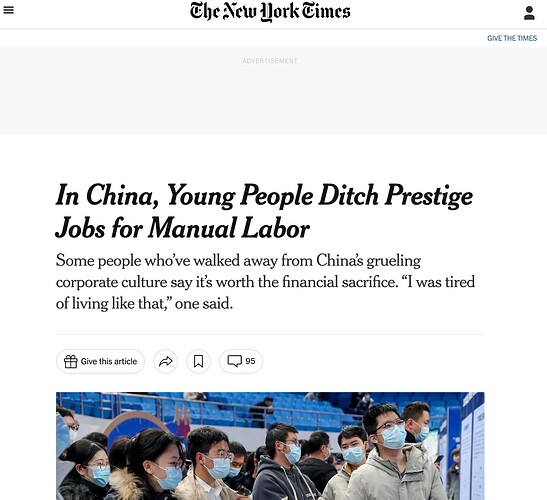-
Loretta Liu于2018年从一所顶尖大学毕业,并在一系列高大上的公司工作,但去年辞职,以之前工资的五分之一做起了美容师。她说,她对自己的工作感到厌倦,想逃离以前工作中的精神消耗。她是中国日益增长的年轻人用高压工作换取体力劳动的趋势的一部分,许多社交媒体的帖子记录了人们做出同样的转换。
-
支持这种转换的人指出,可预测的工作时间和较少的竞争氛围使他们感到高兴。他们承认有牺牲,但表示为了摆脱以前工作的精神消耗,这些牺牲是值得的。许多人正在寻找轻松的体力劳动,而不是高强度的工作。冠状病毒大流行刺激了世界各地的人们重新评估他们的工作价值,但是在中国,还有其他力量在起作用,例如长时间的工作、专横的经理和经济放缓。
-
这种大流行病也使人们认识到,他们的辛勤工作对他们的未来的控制力是多么的小,许多人在感情上已经无法忍受。Loretta Liu说,她更喜欢与不合作的狗搏斗时的身体疲惫,而不是她以前工作的精神损失。她是越来越多的年轻人将高压工作换成体力劳动的趋势的一部分,理由是可预测的工作时间和较少的竞争氛围带来的快乐。
-
两年前,一种被称为 "平躺 "的放弃工作、享受生活的呼吁在网上广泛传播。批评者指责信徒们浪费了他们父母的投资,放弃了帮助中国成为超级大国的勤奋精神。但是其他人则指责一个优先考虑消费主义成功之路的价值观体系,使他们感到失望。随着毕业生人数创下新高,招聘人数减少,一些人现在发现传统上不那么令人羡慕的路线具有吸引力。
-
25岁的Eunice Wang在北京辞去了她的咨询工作,因为沉重的工作负担和一年未见父母而产生了焦虑感。她现在在家乡沈阳的一家咖啡店工作,收入是她以前工资的五分之一。她承认,她很幸运,能够负担得起这样的选择,并重视挑战她长期以来的成功观念的机会。
-
网上的批评者抨击这些换工作的人很幼稚,中国的国家广播公司将失业问题归咎于受过教育的中国年轻人太不愿意从事蓝领工作。社会媒体用户指出,长期以来,体力劳动被认为是需要摆脱的东西,工资较低,而且持续存在歧视。24岁的Yolanda Jiang辞去了建筑设计的工作,找到了一份保安的工作,但最终还是希望能回到办公室工作。
-
Loretta Liu graduated from a top university in 2018, and worked in a series of high-flying companies, but quit last year to work as a groomer for one-fifth of her previous salary. She says she was tired of her job and wanted to escape the spiritual draining of her former job. She is part of a growing trend in China of young people trading high-pressure jobs for manual labor, with many social media posts documenting people making the same switch.
-
Proponents of the switch cite the joy of predictable hours and a less competitive atmosphere. They acknowledge the sacrifices, but say they are worth it to escape the spiritual draining of their former jobs. Many are looking for light physical labor, not intensive work. The coronavirus pandemic has spurred people around the world to reassess the value of their work, but in China there are other forces at play, such as long working hours, domineering managers, and slowing economy.
-
The pandemic has also led to realization of how little control their hard work gives them over their futures, and many have emotionally not been able to bear it anymore. Loretta Liu said that she much preferred the physical exhaustion of wrestling with uncooperative dogs to the mental toll of her previous job. She is part of a growing trend of young people trading high-pressure jobs for manual labor, citing the joy of predictable hours and a less competitive atmosphere.
-
Two years ago, a call to quit work and enjoy life, dubbed “lying flat,” spread widely online. Critics accused adherents of wasting their parents’ investment and abandoning the industriousness that helped build China into a superpower. But others blamed a values system that had prioritized one, consumerist path to success, for their disenchantment. With record numbers of graduates and cutbacks in hiring, some are now finding traditionally less coveted routes attractive.
-
Eunice Wang, 25, quit her consulting job in Beijing after developing anxiety from her heavy workload and not seeing her parents in a year. She now works in a coffee shop in her hometown Shenyang, making one-fifth of her previous salary. She acknowledges that she was lucky to be able to afford such a choice and values the opportunity to challenge her long-held notions of success.
-
Online critics have slammed the job switchers as naïve, and China’s state broadcaster blamed the unemployment problem on young, educated Chinese being too unwilling to take on blue-collar work. Social media users pointed out that manual labor had long been cast as something to be shaken off, with lower wages and persistent discrimination. Yolanda Jiang, 24, resigned from her architectural design job and found a job as a security guard, but is ultimately still hoping to return to an office job.
